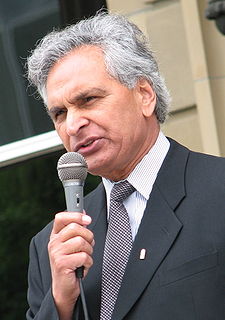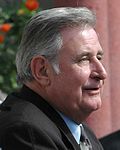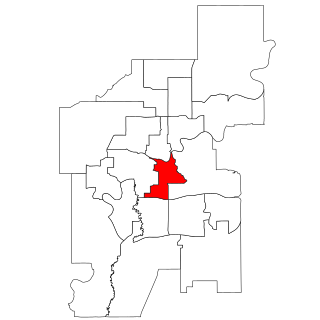| |||||||||||||||||||||||||||||||||||||||||||||||||
83 seats in the Legislative Assembly of Alberta 42 seats needed for a majority | |||||||||||||||||||||||||||||||||||||||||||||||||
|---|---|---|---|---|---|---|---|---|---|---|---|---|---|---|---|---|---|---|---|---|---|---|---|---|---|---|---|---|---|---|---|---|---|---|---|---|---|---|---|---|---|---|---|---|---|---|---|---|---|
| Turnout | 53.38% | ||||||||||||||||||||||||||||||||||||||||||||||||
| |||||||||||||||||||||||||||||||||||||||||||||||||
| |||||||||||||||||||||||||||||||||||||||||||||||||
The Alberta general election of 2001 was the twenty-fifth general election for the Province of Alberta, Canada. It was held on March 12, 2001 to elect members of the Legislative Assembly of Alberta.

Alberta is a western province of Canada. With an estimated population of 4,067,175 as of 2016 census, it is Canada's fourth most populous province and the most populous of Canada's three prairie provinces. Its area is about 660,000 square kilometres (250,000 sq mi). Alberta and its neighbour Saskatchewan were districts of the Northwest Territories until they were established as provinces on September 1, 1905. The premier has been Rachel Notley since May 2015.

Canada is a country in the northern part of North America. Its ten provinces and three territories extend from the Atlantic to the Pacific and northward into the Arctic Ocean, covering 9.98 million square kilometres, making it the world's second-largest country by total area. Canada's southern border with the United States is the world's longest bi-national land border. Its capital is Ottawa, and its three largest metropolitan areas are Toronto, Montreal, and Vancouver. As a whole, Canada is sparsely populated, the majority of its land area being dominated by forest and tundra. Consequently, its population is highly urbanized, with over 80 percent of its inhabitants concentrated in large and medium-sized cities, many near the southern border. Canada's climate varies widely across its vast area, ranging from arctic weather in the north, to hot summers in the southern regions, with four distinct seasons.

The Legislative Assembly of Alberta is one of two components of the Legislature of Alberta, the other being Elizabeth II, Queen of Canada, represented by the Lieutenant-Governor of Alberta. The Alberta legislature meets in the Alberta Legislature Building in the provincial capital, Edmonton. The Legislative Assembly consists of 87 members, elected first past the post from single-member electoral districts.
Contents
The incumbent Alberta Progressive Conservative Party, led by Ralph Klein, won a strong majority for its tenth consecutive term in government. In addition to increasing its share of the popular vote to almost 62%, the PC Party won a majority of seats in Edmonton for the first time since 1982. In the process, they reduced the opposition to only nine MLAs in total. It was the Tories' biggest majority since the height of the Peter Lougheed era.
The Progressive Conservative Association of Alberta was a provincial centre-right party in the Canadian province of Alberta. The party formed the provincial government, without interruption, from 1971 until the party's defeat in the 2015 provincial election under Premiers Peter Lougheed, Don Getty, Ralph Klein, Ed Stelmach, Alison Redford, Dave Hancock and Jim Prentice. At 44 years, this was the longest unbroken run in government at the provincial or federal level in Canadian history.

Ralph Phillip Klein, was a Canadian politician who served as the 12th Premier of Alberta and leader of the Progressive Conservative Association of Alberta from 1992 until his retirement in 2006. Klein's tenure as premier ended when the Alberta Progressive Conservatives' new leader, Ed Stelmach, assumed office December 14, 2006, exactly fourteen years after Klein first became Premier. His nickname was "King Ralph", a reference to his political longevity and his management style. Klein continued the PC dynasty, winning four consecutive majority governments.

Edmonton is the capital city of the Canadian province of Alberta. Edmonton is on the North Saskatchewan River and is the centre of the Edmonton Metropolitan Region, which is surrounded by Alberta's central region. The city anchors the north end of what Statistics Canada defines as the "Calgary–Edmonton Corridor".
The Liberal Party lost 11 seats and ran up a large debt. Its leader, Nancy MacBeth, was defeated in her riding.
The Alberta Liberal Party is a provincial political party in Alberta, Canada. Founded in 1905, it was the dominant political party until the 1921 election, with the first three provincial Premiers being Liberals. Since 1921, it has formed the official opposition in the Legislative Assembly of Alberta several times, most recently from 1993 until 2012. Fourteen Liberals have served as Leader of the Opposition of Alberta.
Nancy MacBeth, née Elliott is a Canadian politician, who was the leader of the Alberta Liberal Party from 1998 to 2001.

An electoral district in Canada, also known as a "constituency" or a "riding", is a geographical constituency upon which Canada's representative democracy is based. It is officially known in Canadian French as a circonscription, but frequently called a comté (county).
The New Democratic Party, led by Raj Pannu, hoped to make gains at the expense of the Liberals in Edmonton and replace them as the official opposition. This did not materialize, but the party did manage to maintain its share of the popular vote and held onto their two seats in the legislature. The NDs attempted to attract young voters with the slogan, "Raj against the Machine".

The Alberta New Democratic Party, commonly shortened to Alberta NDP, is a social-democratic political party in Alberta, Canada, which succeeded the Alberta section of the Co-operative Commonwealth Federation and the even earlier Alberta wing of the Canadian Labour Party and the United Farmers of Alberta. From the mid-1980s to 2004, the party abbreviated its name as the "New Democrats" (ND).

Rajinder Singh "Raj" Pannu is a Canadian educator and politician, who led the Alberta New Democratic Party from 2000 to 2004.
The right-wing Alberta First Party, contesting its first election, failed to win any seats or come close to winning any. The Social Credit Party, led by James Albers, was unable to build on its moderate success in the 1997 election, and sank back into obscurity. Socred leader Lavern Ahlstrom, however, performed well in Rocky Mountain House and finished second behind the incumbent Ty Lund.
James Albers is a former provincial level politician from Alberta, Canada.
Lavern Ahlstrom is a retired provincial level politician and former leader of the Alberta Social Credit Party.










